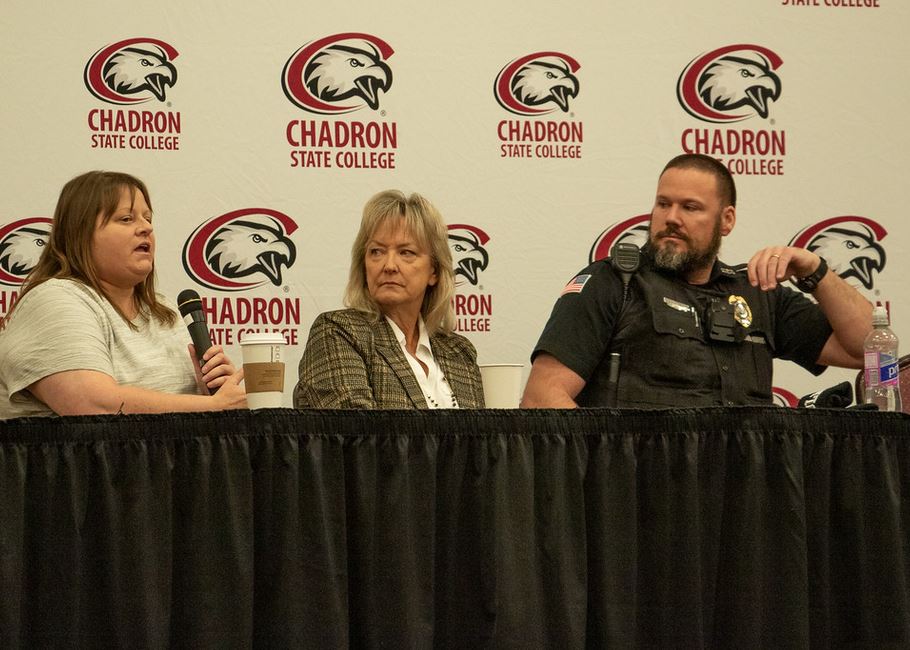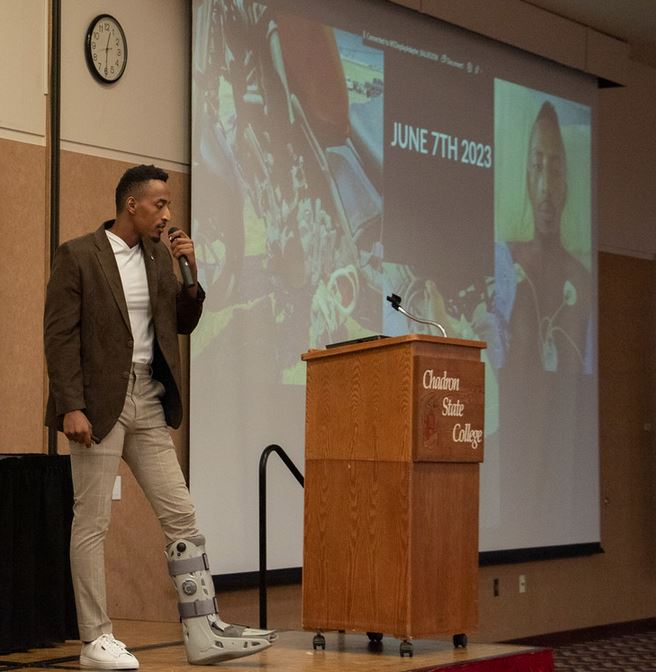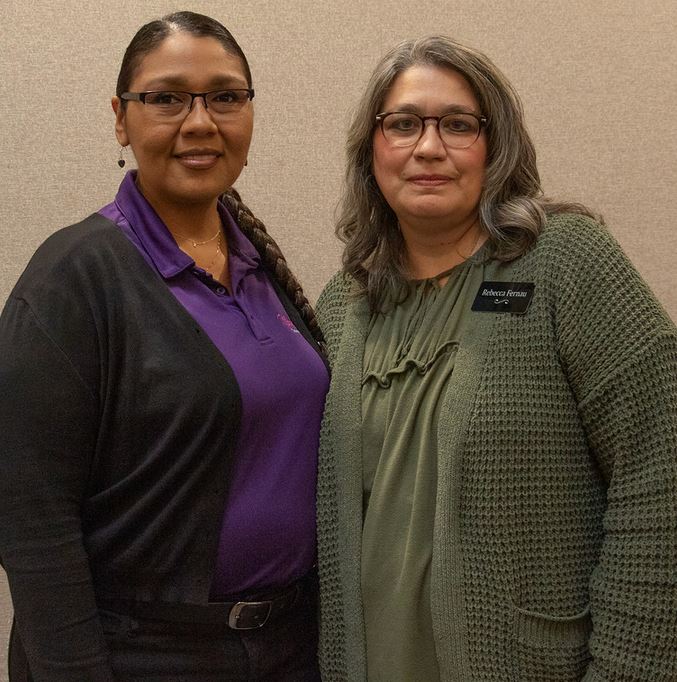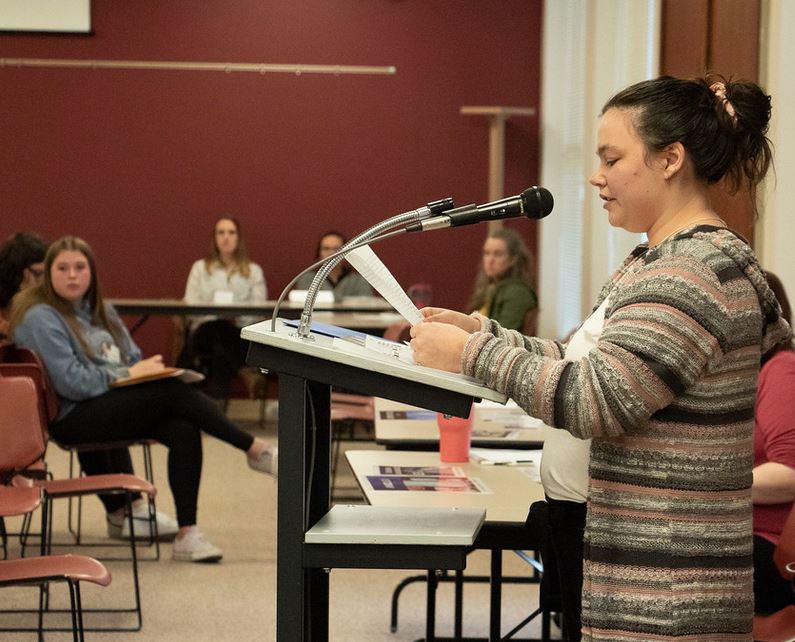Social Work conference addresses poverty
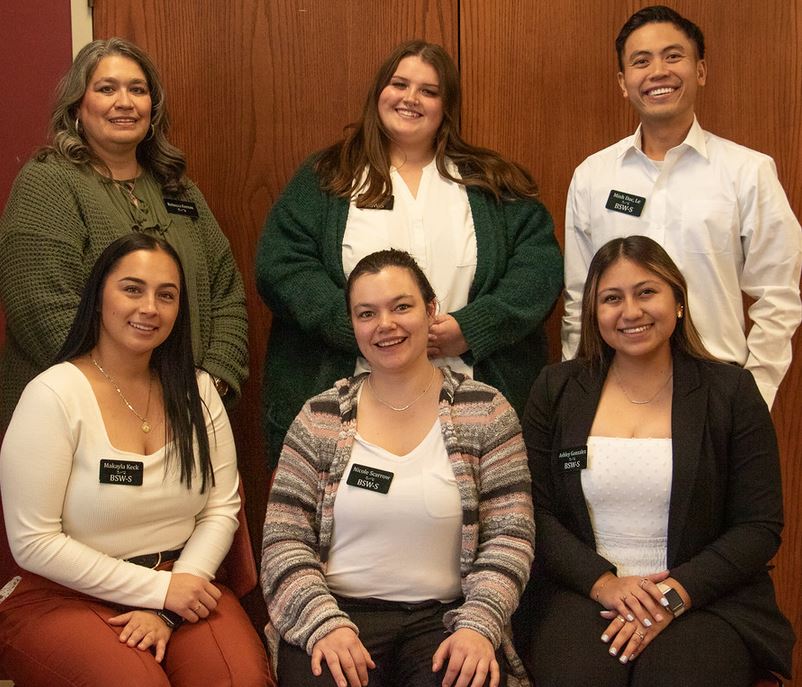
CHADRON – Chadron State College seniors in the Social Work program presented a conference Nov. 8 entitled Helping Overcome Poverty and Eliminations (HOPE). Members of the SW435 class taught by Rebecca Fernau are Ashley Gonzalez-Rodriguez of Marquette, Neb., Makayla Keck of Pueblo, Colo., Minh Le of Saigon, Vietnam, Nicole Scarrow of Chadron, and Madison Watt of Broomfield, Colo.
The morning sessions consisted of speakers followed by a poverty simulation in the afternoon.
Interim Dean of Curriculum, Accreditation, and the School of Professional Studies and Applied Sciences Dr. Grant Sasse said he applauded the faculty and students in the professional Social Work program for a successful conference.
“With all the changes in the department, the conference was a real achievement. Especially the poverty simulation. It gave the participants a real perspective on real issues that folks encounter on a daily basis,” Sasse said.
Keynote speaker Anitra Warrior, American Indian Child Psychologist and owner of Morningstar Counseling in Lincoln, opened the conference by describing factors that contribute to generational poverty.
“We need to try to understand the lens through which the people we serve view the world,” she said. “What is being passed down from generation to generation? We need to consider the unwelcome inheritance including thought processes and mindsets.”
She shared a video explaining the welfare trap, a situation when benefits decrease as heads of households gain employment, effectively penalizing them for working and creating an incentive for them to stay on government assistance.
Warrior said 94 million people in the U.S. live close to poverty. Although Nebraska is not as low as the national level of poverty, post-pandemic anxiety, depression, and fear among students and teachers are creating a teacher shortage and negatively affecting access to quality education for Nebraska’s children, according to Warrior.
Other factors that influence poverty include economic stability, transportation, food security, and crime.
“Poverty really costs us a lot, as residents and as a nation,” Warrior said.
She explained that to assume everyone can read or process text on a slide is just one subtle example of discrimination and privilege that future social workers should be aware of.
Warrior asked for other examples and audience members shared that they work with the elderly who need to access benefits or services online even though they do not have a computer or are not comfortable with using computers. Additional examples were dyslexia and children not having warm winter coats.
Following Warrior’s presentation, a panel discussion included Jennifer Schaer, Director of Project Strive/TRIO at CSC, Rachel Johnson, Director of Volunteer Services and RSVP at Northwest Community Action Partnership, and Derek Bauer, Chadron Public School District School Resource Officer.
Schaer said often helping students in need can consist of something as simple as listening.
Audience member and CSC alum Toi Riggs, a social worker with Chadron Public Schools, said most school counselors have food in their offices for children.
Johnson shared a number of programs her agency administers or assists with including parenting classes, Head Start, the Kiwanis weekend backpack program for children, Salvation Army, and the Donate Don’t Dump It partnership with CSC where unwanted furnishings are donated in May when students move. In five years, sales of the items rescued from the landfill totaled $88,000 for meals through the Feed a Senior in Need program.
In a discussion about alternatives to fines or jail time, Johnson said useful and practical volunteer options for community service hours exist at locations such as Closer to Home where lunches are served during the week.
“I enjoy being a capacity builder. Helping people help other people is rewarding. Give people the benefit of the doubt as you work with them,” she said.
Bauer, a CSC graduate, said poverty seems to have a higher correlation with mental health issues and drug and alcohol issues, even though both cross all income boundaries.
He said the local Shop with a Cop where children in need buy coats with officers is good, but inadequate for the variety and level of need.
The final speaker of the conference, Jeff Mugongo, a 2020 CSC Social Work alum, outlined characteristics that helped him survive life in a refugee camp in Rwanda and eventually be able to resettle in Colorado with his mother and siblings. They are gratitude, faith or unwavering confidence in the darkness, self-discipline, and resilience.
As a nine-year-old, he had to take 41 goats to the jungle every day to graze for seven years.
“It was not an easy life. There were wild beasts in the jungle. I did start losing hope and was on the edge of despair. Moving to the U.S. was a complete culture shock,” Mugongo said. “When I was in college and wanted to drop out and work to help my mom, she reminded me to stay in college. I felt so driven after she talked to me.”
Mugongo, founder of JTS Fitness, a sports training program designed to assist children and youth in developing athletic techniques, was driving a motorcycle in June when a car hit him breaking both of his legs.
He described challenges to his recovery from the injuries including facing questions, doubts, fears, and pain management medications. His doctor shared the example of Alex Smith an NFL player who recovered from a similar injury in 2018 that threatened his leg and his life.
“Alex Smith went through that challenging time and worked hard in the gym with a goal to come back to the NFL and play. He did and led his team to the championship. Hearing that story helped me. I hung on to that,” Mugongo said.
A two-hour poverty simulation in the afternoon featured participants assuming the identities of family members facing poverty while role-playing a month trying to maintain basic needs.
During the debriefing, led by Fernau, volunteers who staffed stations representing agencies providing services said some of the services were under-utilized.
Some participants said they felt it was necessary to leave children or disabled adults home alone because they could not access affordable childcare. This decision often led to encounters with child protection or law enforcement officers, further complicating the situation.
Other participants expressed their frustration about applying for benefits since office hours conflicted with their work hours and transportation was not always available.
Fernau invited the participants to share their experiences from the simulation with family, friends, and contacts in the community.
Category: Campus News, Social Work

